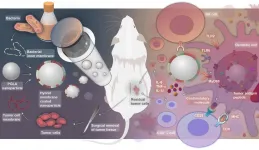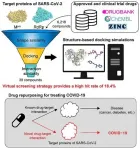(Press-News.org) Diabetes is the leading cause of kidney failure in the United States, but identifying type 1 or type 2 diabetes patients at high risk for progressive kidney disease has never had a sure science behind it.
Historically, assessing kidney function meant looking at estimated glomerular filtration rate, a calculation that determines how well blood is filtered by the kidneys, and urine albumin excretion, a urine test to detect the amount of the protein albumin, which is filtered by the kidneys. However, both tests have limited predictive power in early stage diabetes when kidney function is normal.
The therapeutic approach to both type 1 and type 2 diabetic kidney disease also follows a similar strategy, despite having different biological causes.
Now, with more advanced technology available, a multi-institution international research team sought out to understand what lipid biomarkers may predict the progression of diabetic kidney disease and how these predictors differ between type 1 and type 2 diabetes.
The case-control study, published in Diabetes Care, included more than 800 patients with type 1 diabetes since patients with type 2 have been the target of previous studies published by the lead author, Farsad Afshinnia, M.D., a nephrologist at University of Michigan Health, part of Michigan Medicine, and in the Michigan O'Brien Kidney Translational Center, part of the University of Michigan Medical School.
The case group were patients with a rapid decline in their kidney function (as measured by a substantial fall in their estimated glomerular filtration rate), compared to the control subjects who showed preserved kidney function (minimal decline of their estimated glomerular filtration rate) over a 4-year follow-up period.
Notably, Afshinnia and his team found differences in lipid predictors of diabetic kidney disease between type 1 and type 2 patients, and these biomarkers could be identified in early stage diabetes when standard markers of kidney function such as glomerular filtration rate and urine albumin excretion, are normal.
"These findings not only provide a platform for risk stratification, but also suggest the underlying mechanism of progressive kidney disease," said Afshinnia, who also works in the University of Michigan JDRF Center of Excellence. "Understanding the mechanism may be a future target for therapeutic intervention."
Testing a hypothesis
In earlier studies of patients with type 2 diabetes, Afshinnia and senior author Subramaniam Pennathur, M.D., also the chief of nephrology at University of Michigan Health and director of the Michigan O'Brien Kidney Translational Center, have shown that certain lipids affect the progression of diabetic kidney disease in those with type 2 diabetes.
Unique to type 2, though, lipid alterations can be mediated by insulin resistance.
Since patients with type 1 diabetes and normal kidney function are typically sensitive to insulin, the research team anticipated that the biomarkers of kidney disease progression in type 1 would be different than those in type 2.
Specifically, Afshinnia, Pennathur and their research team hypothesized that there would be a unique pattern of circulating free fatty acids, acylcarnitines and glycerolipids between type 1 and type 2 diabetes, making clear what biomarkers in the body can cause rapid or slow decline of kidney function.
"Both types of diabetes can result in diabetic kidney disease, later requiring dialysis or transplantation," said Pennathur. "The current standard of care for patients with diabetes is to optimize their blood sugar and blood pressure control, but better biochemical markers of kidney function decline in patients with normal kidney function is lacking."
Using precision medicine in this way could accurately identify patients vulnerable for future loss of kidney function in patients with either type 1 or type 2 diabetes.
Discovering an underlying mechanism
After quantifying more than 300 lipids in the more than 800 study participants with type 1 diabetes, the researchers found 47 lipids that were significantly different between rapid and slow kidney function decliners.
Precision medicine helps identify "at-risk rapid decliners" in early-stage kidney disease
A novel therapeutic may halt rapid kidney function in some type 1 diabetic kidney disease patients.
2021-07-08
ELSE PRESS RELEASES FROM THIS DATE:
A novel neurological disorder associated with the Polycomb complex identified
2021-07-08
A multi-institutional study has discovered spontaneous mutations in RNF2 (RING2) gene as the underlying cause of a novel neurological disorder. This Undiagnosed Diseases Network (UDN) study was led by Dr. Shinya Yamamoto, investigator at the Jan and Dan Duncan Neurological Research Institute (NRI) at Texas Children's Hospital and assistant professor at Baylor College of Medicine, and Dr. Vandana Shashi at Duke University Medical Center. Using a combination of comprehensive clinical tests, trio genome sequencing and functional studies in the fruit flies, and global gene matchmaking efforts, the teams found ...
Digital government needs to better take women's digital needs into account
2021-07-08
Amsterdam, July 8, 2021 - While the literature on the digital divide has widely addressed the digital gender gap, its potential implications for electronic government (e-government) / digital government research and practice have hardly been studied. In this Special Issue of Information Polity experts characterize the current state of understanding of the issues surrounding digital government and gender and present an agenda for future research.
Gender is a neglected topic in the literature on digital government. According to the International Telecommunications Union, women are lagging behind men in making ...
Advocacy for a digital oral health that leaves no one behind
2021-07-08
demic have already had a dramatic impact on the prevailing oral health care model and will continue to do so. The paper "Advocacy for a Digital Oral Health That Leaves No One Behind," published in the JDR Clinical & Translational Research (JDR CTR), promotes the use of digital tools to offer opportunities to improve healthy behavior, lower risk factors common to oral diseases and other noncommunicable diseases and contribute to reducing oral health inequalities.
To mitigate the impact of the COVID-19 pandemic lockdowns, systems were quickly put in place in most countries to respond to dental emergencies, ...
Protein supplements work for women and not men, during fasted carb-restricted training
2021-07-08
Consuming a protein supplement, specifically protein hydrolysate, during carbohydrate-restricted training was helpful for improving training intensity in women, but not in men.
That's according to new research which will be part of a presentation this week at The Physiological Society's Annual Conference Physiology 2021.
Most nutrition guidelines for athletes are based on research in men only. This study, by Tanja Oosthuyse and her colleagues, emphasizes that this shouldn't be the case, because nutritional research findings in men don't always apply to women.
While the protein supplement helped training intensity in women, it did not improve training intensity and instead resulted in modest negative effect in men. It made exercise ...
Women with recurrent UTIs voice 'fear and frustration' over treatment options
2021-07-08
July 8, 2021 - Women with recurrent urinary tract infections (UTIs) experience frustration related to their treatment - particularly the risks from repeated use of antibiotics, according to a focus group study in The Journal of Urology®, Official Journal of the American Urological Association (AUA). The journal is published in the Lippincott portfolio by Wolters Kluwer.
"This study was prompted by our experience treating countless women with recurrent UTIs referred to our specialized Female Pelvic Medicine and Reconstructive Surgery center," comments senior author Ja-Hong Kim, MD, of UCLA Center of Women's Pelvic Health. "The vast majority were understandably dissatisfied with their care pathway, which was primarily antibiotic-focused ...
An antioxidative stress regulator protects muscle tissue in space
2021-07-08
Ibaraki, Japan - Most kids dream of growing up to be astronauts; but the downside of spending extended amounts of time in low gravity is that astronauts' muscles tend to shrink and weaken through disuse. Now, researchers from Japan have identified a protein that affects how muscles respond to space flight.
In a study published in June 2021 in Communications Biology, researchers from the University of Tsukuba have revealed that nuclear factor E2-related factor 2, or NRF2, helps keep muscles from becoming weak in low gravity.
Muscle atrophy, or weakening, is a common feature of disease and aging. It can also occur after a long period of inactivity, such as during space flight, when astronauts don't need to use their muscles as much as they do on Earth to support ...
Personalized tumor vaccines may solve tumor recurrence and metastasis challenges
2021-07-08
Thanks to the rapid development of nanotechnology, a research team led by Profs. NIE Guangjun, WU Yan and ZHAO Yuliang from the National Center for Nanoscience and Technology (NCNST) of the Chinese Academy of Sciences (CAS) recently designed personalized tumor vaccines based on bacterial cytoplasmic membranes and cell membranes from resected tumor tissue. This work was published in Science Translational Medicine.
Cancer vaccines are an effective anti-tumor therapeutic option that utilize tumor antigens to stimulate patients' immune response and specifically kill tumor cells. Postoperative recurrence and metastasis after surgery can thus be effectively inhibited by the activated immune system. Therefore, ...
NUS researchers bring attack-proof quantum communication two steps forward
2021-07-08
Quantum key distribution (QKD) is a method for secure communication that uses quantum mechanics to encrypt information. While the security of QKD is unbreakable in principle, if it is incorrectly implemented, vital information could still be stolen by attackers. These are known as side-channel attacks, where the attackers exploit weaknesses in the setup of the information system to eavesdrop on the exchange of secret keys.
Researchers from the National University of Singapore (NUS) have developed two methods, one theoretical and one experimental, to ensure that QKD communications cannot be attacked in this way. The first is an ultra-secure cryptography protocol that can be deployed in any communication network that needs long-term ...
NIH researchers expand Families SHARE, an educational genomics workbook
2021-07-08
Researchers at the National Human Genome Research Institute (NHGRI), part of the National Institutes of Health (NIH), have developed the Families Sharing Health Assessment and Risk Evaluation (SHARE) workbook, which helps people use their family history to assess their risk for heart disease, diabetes, breast cancer and colorectal cancer.
Since 2012, Laura Koehly, Ph.D., and her research team have measured the accessibility and usability of the workbook by working with communities and continually updating the workbook to address issues. Koehly is the chief of the Social ...
Repurposed drugs present new strategy for treating COVID-19
2021-07-08
A joint research group from KAIST and Institut Pasteur Korea has identified repurposed drugs for COVID-19 treatment through virtual screening and cell-based assays. The research team suggested the strategy for virtual screening with greatly reduced false positives by incorporating pre-docking filtering based on shape similarity and post-docking filtering based on interaction similarity. This strategy will help develop therapeutic medications for COVID-19 and other antiviral diseases more rapidly. This study was reported at the Proceedings of the National Academy of Sciences of ...
LAST 30 PRESS RELEASES:
ASU researchers to lead AAAS panel on water insecurity in the United States
ASU professor Anne Stone to present at AAAS Conference in Phoenix on ancient origins of modern disease
Proposals for exploring viruses and skin as the next experimental quantum frontiers share US$30,000 science award
ASU researchers showcase scalable tech solutions for older adults living alone with cognitive decline at AAAS 2026
Scientists identify smooth regional trends in fruit fly survival strategies
Antipathy toward snakes? Your parents likely talked you into that at an early age
Sylvester Cancer Tip Sheet for Feb. 2026
Online exposure to medical misinformation concentrated among older adults
Telehealth improves access to genetic services for adult survivors of childhood cancers
Outdated mortality benchmarks risk missing early signs of famine and delay recognizing mass starvation
Newly discovered bacterium converts carbon dioxide into chemicals using electricity
Flipping and reversing mini-proteins could improve disease treatment
Scientists reveal major hidden source of atmospheric nitrogen pollution in fragile lake basin
Biochar emerges as a powerful tool for soil carbon neutrality and climate mitigation
Tiny cell messengers show big promise for safer protein and gene delivery
AMS releases statement regarding the decision to rescind EPA’s 2009 Endangerment Finding
Parents’ alcohol and drug use influences their children’s consumption, research shows
Modular assembly of chiral nitrogen-bridged rings achieved by palladium-catalyzed diastereoselective and enantioselective cascade cyclization reactions
Promoting civic engagement
AMS Science Preview: Hurricane slowdown, school snow days
Deforestation in the Amazon raises the surface temperature by 3 °C during the dry season
Model more accurately maps the impact of frost on corn crops
How did humans develop sharp vision? Lab-grown retinas show likely answer
Sour grapes? Taste, experience of sour foods depends on individual consumer
At AAAS, professor Krystal Tsosie argues the future of science must be Indigenous-led
From the lab to the living room: Decoding Parkinson’s patients movements in the real world
Research advances in porous materials, as highlighted in the 2025 Nobel Prize in Chemistry
Sally C. Morton, executive vice president of ASU Knowledge Enterprise, presents a bold and practical framework for moving research from discovery to real-world impact
Biochemical parameters in patients with diabetic nephropathy versus individuals with diabetes alone, non-diabetic nephropathy, and healthy controls
Muscular strength and mortality in women ages 63 to 99
[Press-News.org] Precision medicine helps identify "at-risk rapid decliners" in early-stage kidney diseaseA novel therapeutic may halt rapid kidney function in some type 1 diabetic kidney disease patients.



